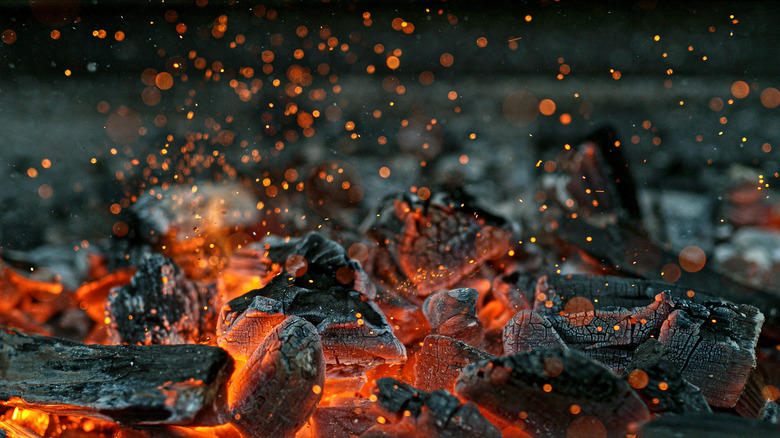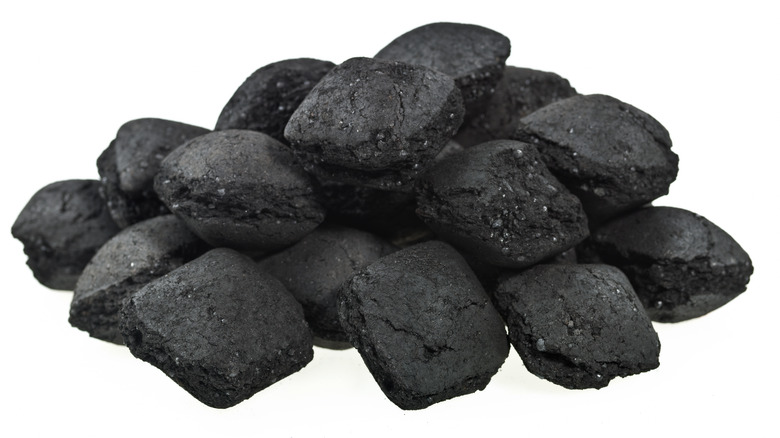Ditch Plain Briquettes This Summer And Opt For Coconut Charcoal
As barbecue season approaches, many people will soon be breaking out their Weber grills for the season and stocking up on charcoal for their spring and summer cookouts. While you're getting your supplies ready this year though, maybe it's time to consider an alternative to the classic charcoal briquettes stocked at your local hardware store; something that will get the job done just as well without all the smoke and ash. No, not propane. Coconuts!
While most charcoal grill users favor either charcoal briquettes or lump charcoal to cook up their burgers and steaks, there are actually a number of alternative fuel options available which achieve the same purpose with less mess, including coconut charcoal. While traditional briquettes are made from compacted sawdust and wood and bound together with chemical additives, Coco Produce explains that coconut charcoal is made from compacted coconut husks and shells, bound together with tapioca flour instead of potentially harmful chemicals, which means it burns cleaner than more traditional wood-based coals.
Clean coals
While charcoal grill enthusiasts often tout the superior taste of food grilled over coals, there is no doubt that it's a messy business. Charcoal, especially charcoal briquettes, let off a lot of smoke as they burn, which contains significant amounts of carbon monoxide and potentially carcinogenic fumes, due to the chemicals which hold the briquettes together.
Not only do coconut briquettes not contain these hazardous chemicals, but they also cook with minimal smoking. According to Royce Food Corporation, which produces coconut charcoal, the coals are virtually smokeless, which means the risk of inhaling dangerous fumes is reduced — as is the unpleasant smell that can hang in the air and cling to the clothes, skin, and hair of whoever is doing the grilling. Fewer fumes also means less risk of chemical tastes sticking to your food, so your barbecue guest will be able to appreciate the natural flavors of whatever you're grilling, and since it burns clean, there's also no risk of imbuing your food with the taste or smell of coconut.
Additionally, coconut briquettes burn to only 5 %to 10% ash, which means there is much less debris to worry about when you're done grilling, and since it is all natural, it can simply be dumped into your garden where it will act as a fertilizer.
Sustainable grilling
Not only are coconut briquettes cleaner and safer to use than traditional charcoal, they are also better for the environment. While any smokeless fuel is obviously going to be better for the local air quality, coconut charcoal is also sustainably sourced. Coconut charcoal is made from the husks of a fruit that is enormously plentiful and grows quickly. According to Statista, there are over 60 million metric tons of coconut produced globally each year, and most of it goes towards products like coconut milk, water, and oil — all of which are extracted from coconut meat. That means there are a lot of coconut husks out there that could be made into briquettes. Furthermore, one bag of coconut briquettes goes further than normal briquettes. According to Coco Produce, coconut charcoal burns hotter than regular charcoal and lasts twice as long, which means that you will need to buy less of it during a single summer of grilling.
Although it has not yet fully caught on in the mainstream, that does not mean coconut charcoal is expensive or hard to get. You can find several brands available on Amazon for between $20 and $30 per box, which considering its extended burn time, is about on par with the price of old-fashioned briquettes.


